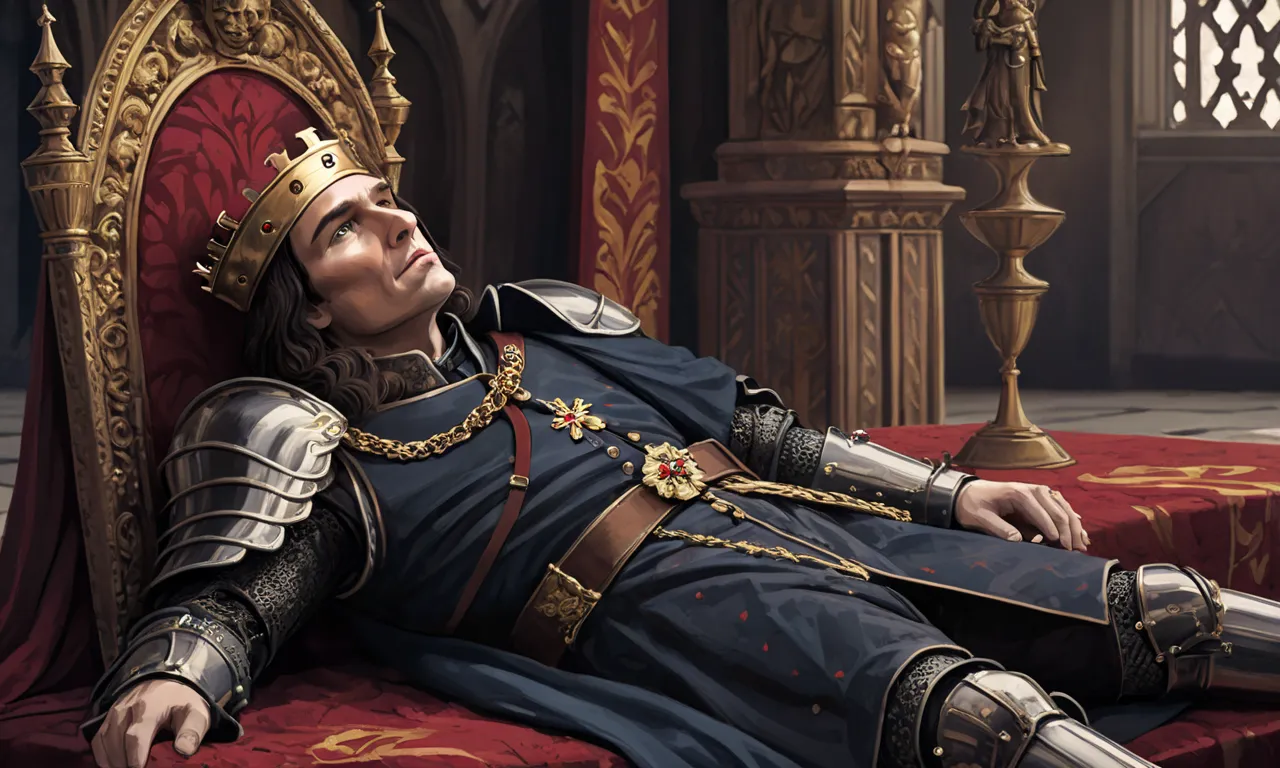Richard III Dream Meaning: Unraveling the Mysteries of Shakespeare’s Tragedy

The Richard III, a tragedy written by William Shakespeare, is an intriguing exploration into human nature and the complexities of power. The story revolves around Richard III, who was the last king of England from the House of York and is believed to have caused the death of his two nephews in order to seize the throne. Throughout the play, there are various dreams that play a crucial role in shaping the characters’ actions and their understanding of fate. In this article, we will delve into the dream meaning of Richard III and explore how these dreams shape the narrative, the characters, and our own interpretations of power and morality.
The Opening Dream: A Vision of War and Strife
The play opens with a dream sequence where King Edward IV sees his coffin being carried to the grave by four men. The king’s dreams are prophetic, and in this instance, it foreshadows his imminent death. This opening dream sets the tone for the rest of the play, as it signifies that there is a dark force at work, ready to claim power and unleash chaos upon England.
The Dream of Queen Elizabeth: A Warning of Betrayal
Queen Elizabeth, the mother of Edward IV’s two sons, has a dream in which she sees her husband’s corpse carried to its resting place by Richard III. This dream serves as a warning to Elizabeth and foreshadows the betrayal that lies ahead when Richard seizes power and causes the deaths of both her sons.
The Vision of Clarence: A Premonition of Doom
In another notable dream sequence, Richard III’s brother, George Duke of Clarence, has a vision in which he sees himself drowning in a cask of Malmsey wine. This dream is prophetic and serves as a premonition of his impending doom at the hands of his brother.
The Dream of Richard III: A Quest for Power
Richard’s dreams are driven by his insatiable desire for power and control. Throughout the play, we see him scheming and manipulating others to achieve his goal of becoming king. In one of his most famous speeches, he acknowledges his ambition but justifies it as a means to an end:
“Now is the winter of our discontent Made glorious summer by this sun of York; And all the clouds that lower’d upon our house In the deep bosom of the ocean buried. Now are our brows bound with victorious wreaths; Our bruised arms hung up for monuments; Our stern alarums changed to merry meetings, Our dreadful marches to delightful measures.
“God’s will! I pray thee, wish not one man better Than another: better a warrior’s death Than a coward’s life.”
Richard’s dreams are fueled by his desire for power and control. He is driven by ambition and a willingness to do whatever it takes to achieve his goal. This includes betraying those closest to him, including his brother Clarence and the young princes in the Tower.
The Dreams of the Common People: A Symbol of Unrest
Throughout the play, we see glimpses of dreams and visions experienced by common people, which serve as a symbol of unrest and dissatisfaction with Richard’s rule. These dreams often involve chaos, war, and death – reflecting the general discontent among the populace due to Richard’s tyranny and cruelty.
The Dream Sequence in Act 5: The Final Betrayal
In the final act of Richard III, we see a dream sequence involving Richard, his brother George, Duke of Clarence, and their mother Cecily. In this dream, Richard confesses his sins and begs for forgiveness. This dream serves as a reflection of his conscience and the guilt he feels for betraying his family and committing numerous atrocities throughout the play.
The Significance of Dreams in “Richard III”
The dreams in Richard III serve several purposes within the narrative. They provide insight into the characters’ motivations, foreshadow events that will unfold, and reflect the overall mood and atmosphere of the play. Additionally, they emphasize the theme of power and its corrupting influence on those who seek it.
Conclusion
In conclusion, dreams play a significant role in Richard III, offering insights into the characters’ motivations and desires while also providing a commentary on the themes of power, betrayal, and morality. By examining these dreams closely, we can gain a deeper understanding of Shakespeare’s masterpiece and its enduring relevance to our own lives and society today.
Summary
- The play opens with King Edward IV’s dream of his coffin being carried to the grave by four men.
- Queen Elizabeth has a dream where she sees her husband’s corpse being carried away by Richard III.
- George Duke of Clarence’s vision in which he drowns in a cask of Malmsey wine is a premonition of his death at the hands of his brother, Richard III.
- Richard III’s dreams are driven by his ambition for power and control.
- The dreams of common people serve as a symbol of unrest and dissatisfaction with Richard’s rule.
- In Act 5, Richard confesses his sins in a dream sequence involving his brother George, Duke of Clarence, and their mother Cecily.
- Dreams provide insight into the characters’ motivations, foreshadow events, and reflect the themes of power, betrayal, and morality in Richard III.






